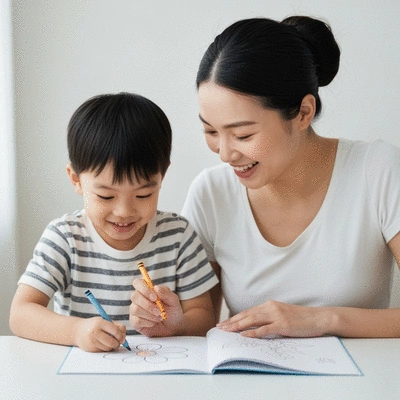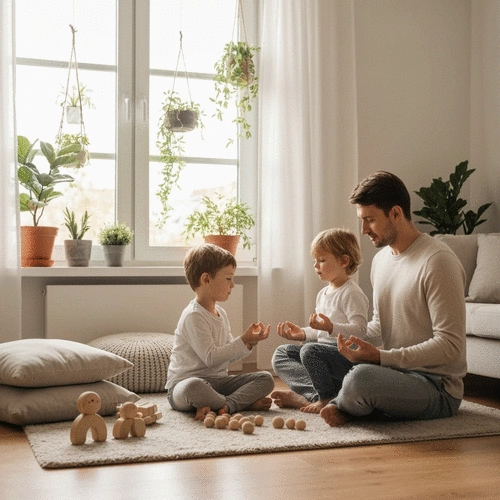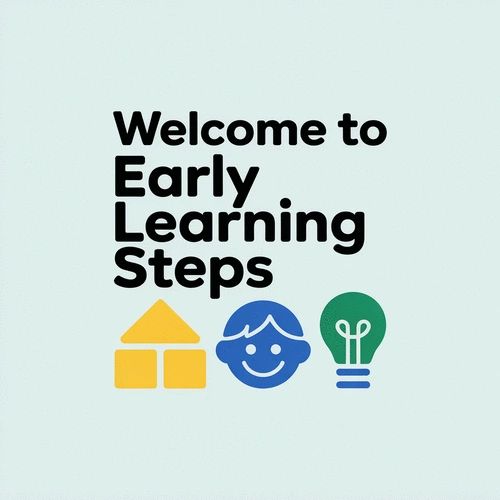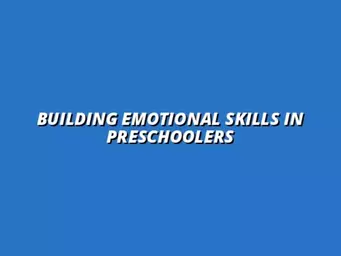What if you could transform your parenting style to create deeper connections with your children? Mindful parenting offers a pathway to achieve just that, enhancing emotional growth for both parents and children. Let's explore some key takeaways that can help you embrace this approach.
What You Will Learn
- Mindful parenting focuses on being fully present and engaging with your child, enhancing their sense of value.
- This approach fosters emotional resilience and strengthens family bonds by promoting a nonjudgmental atmosphere.
- Practicing self-compassion helps both parents and children acknowledge imperfections, nurturing healthier emotional responses.
- Incorporating mindfulness techniques can improve communication skills and encourage emotional intelligence within the family.
The Core Elements of Mindful Parenting
Mindful parenting focuses on three key areas: Being Present, Practicing Patience, and Fostering a Nonjudgmental Atmosphere. These elements create a nurturing environment for both parents and children, helping to foster emotional regulation in children.
Being Present & Attentive
Active engagement; listening attentively and responding thoughtfully, creating a sense of being valued and understood.
Practicing Patience & Empathy
Responding thoughtfully rather than reacting, fostering a supportive environment for emotional growth.
Fostering a Nonjudgmental Atmosphere
Observing thoughts and feelings without judgment, allowing children to feel safe and secure.
Understanding Mindful Parenting and Its Importance
In today’s fast-paced world, mindful parenting has emerged as a refreshing approach to raising children. At Early Learning Steps, we believe that this practice allows parents to fully engage in their children’s lives, fostering a deeper connection. But what exactly is mindful parenting, and why is it so crucial for families?

Mindful parenting encourages us to be present and aware in our interactions with our children. It involves observing our thoughts and feelings without judgment, creating a supportive environment that nurtures emotional growth. Have you ever noticed how just pausing to breathe can change the entire atmosphere at home? This practice can transform the way we relate to our children, helping us respond rather than react.
What is Mindful Parenting?
At its core, mindful parenting is about being intentionally present with your child. It involves active engagement, which means listening attentively and responding thoughtfully. Instead of multitasking during playtime or conversations, we focus our full attention on our children. This creates a space where they feel valued and understood, much like the principles behind the importance of play in early childhood development.
- Being present and attentive
- Practicing patience and empathy
- Fostering a nonjudgmental atmosphere
By incorporating these elements, we can build stronger relationships with our children, allowing them to feel safe and secure. Mindful parenting is not about perfection; it’s about progress and connection!
Why Mindful Parenting Matters for Families
Mindful parenting holds immense significance for families as it cultivates emotional resilience and strengthens bonds. In a world filled with distractions, it’s easy to lose touch with what truly matters. By embracing this approach, we can create a nurturing environment where children flourish both emotionally and socially.
- Enhances communication skills
- Encourages emotional intelligence
- Promotes a calmer home atmosphere
When we practice mindful parenting, we not only support our children’s development but also nurture our own well-being. It encourages us to reflect on our parenting styles and adapt them in ways that benefit our entire family. Remember, as parents, we are the role models for our children; embracing mindfulness can inspire them to lead balanced lives as well!
Pro Tip
To enhance your mindful parenting journey, try incorporating a daily gratitude practice. Each evening, take a moment to share with your child three things you are grateful for that day. This simple exercise not only fosters a positive mindset but also strengthens your emotional connection with your child, allowing them to appreciate the little joys in life.
Reflecting on the Impact of Mindful Parenting
As we delve into the realm of mindful parenting, it's essential to recognize the profound and lasting impact it can have on family well-being. By adopting mindful practices, families can cultivate a nurturing environment that promotes emotional health and resilience. Let’s explore some of the long-term benefits that arise from this intentional approach to parenting!
Long-Term Benefits for Family Well-being
Mindful parenting fosters a deeper connection among family members, paving the way for healthier relationships. When parents practice mindfulness, they model emotional awareness for their children, which translates to improved communication and understanding. Over time, this creates a family culture that values empathy and respect.
- Improved emotional regulation: Children learn to manage their emotions through observing their parents' mindful responses.
- Stronger familial bonds: Mindfulness encourages open dialogue, leading to enhanced trust and connection.
- Heightened resilience: Families equipped with mindfulness strategies can better navigate life's challenges together.
These benefits are not just fleeting; they contribute to a more harmonious family life where each member feels valued and understood. The emotional intelligence developed during these formative years can create a ripple effect, positively influencing future generations.

Encouraging Self-Compassion Among Parents and Children
In the journey of parenting, we often forget to extend compassion to ourselves. Mindful parenting emphasizes the importance of self-compassion, allowing both parents and children to acknowledge their imperfections without judgment. When we practice self-compassion, we model a healthy approach to mistakes, fostering resilience in our children.
- Allowing space for mistakes: Emphasize that everyone makes errors, and it’s a natural part of learning.
- Practicing positive self-talk: Encourage using kind words when reflecting on oneself, which can transform self-criticism into support.
- Encouraging shared experiences: Engage in discussions about feelings and challenges, affirming that it’s okay to feel overwhelmed sometimes.
Integrating self-compassion within our parenting style nurtures a loving atmosphere where both parents and children can thrive emotionally. It’s a beautiful reminder that we are all on this journey together, learning and growing side by side!
The Importance of Self-Care in Parenting
To embrace mindful parenting effectively, we must prioritize self-care. Taking time for ourselves not only refuels our energy but also sets a precedent for our children on the importance of personal well-being. Here are some self-care strategies I’ve found helpful:
- Scheduled downtime: Carve out moments just for you to recharge, whether it's reading or indulging in a hobby.
- Mindful moments: Engage in a brief mindfulness practice, like meditation or gentle stretching, to reset your mind.
- Community support: Connect with other parents for shared experiences and encouragement—you’re not alone!
By modeling self-care, we teach our children to value their own needs as well, fostering lifelong habits that contribute to a balanced and fulfilling life.
Taking Action: Steps Towards a More Mindful Parenting Approach
Now that we’ve explored the impact of mindful parenting, you might be wondering how to implement these practices in your daily life. With some simple steps, you can start embracing mindfulness today!
How to Start Practicing Mindful Parenting Today
Starting on this journey doesn't have to be overwhelming. Here’s a quick guide to help you integrate mindful practices into your family life:
- Start small: Incorporate brief moments of mindfulness into your routine. This could be a few deep breaths before responding to your child's emotions.
- Set intentions: Each morning, set a mindful intention for your day, focusing on patience or understanding.
- Reflect together: At the end of each day, share what went well and what could improve, reinforcing open communication.
As you take these small steps, you'll likely notice a shift in your family's dynamics, making way for more connection and understanding, and helping you understand different types of early childhood education programs.
Resources and Tools for Ongoing Mindfulness in Parenting
To support your journey in mindful parenting, here are some valuable resources I recommend:
- Parenting Workshops: Attend local or online workshops that focus on mindfulness techniques and community support.
- Books and Blogs: Explore insightful literature that delves deeper into the principles of mindful parenting. I love sharing my favorite books in our Early Learning Steps community!
These tools not only provide guidance but also connect you with others who share your commitment to nurturing a mindful family environment. Remember, we’re all learning together, and every step taken is a step toward creating a more compassionate world!
Frequently Asked Questions About Mindful Parenting
What is mindful parenting?
Mindful parenting is an approach to raising children that emphasizes being fully present, attentive, and nonjudgmental in interactions with your child. It encourages parents to respond thoughtfully rather than react impulsively, fostering a supportive environment for emotional growth.
Why is mindful parenting important?
Mindful parenting is crucial for families because it enhances emotional resilience, strengthens family bonds, and improves communication skills. It helps children develop emotional intelligence and promotes a calmer, more nurturing home atmosphere.
What are the core elements of mindful parenting?
The core elements include being present and attentive, practicing patience and empathy, and fostering a nonjudgmental atmosphere. These elements help create a secure and valued feeling for children.
How can parents practice self-compassion within mindful parenting?
Self-compassion means acknowledging imperfections and mistakes without judgment, both for parents and children. It involves allowing space for errors, practicing positive self-talk, and engaging in shared discussions about feelings and challenges to foster resilience.
What are some long-term benefits of mindful parenting?
Long-term benefits include improved emotional regulation in children, stronger familial bonds through open dialogue and trust, and heightened resilience for families to navigate life's challenges more effectively.
Recap of Key Points
Here is a quick recap of the important points discussed in the article:
- Mindful parenting involves being present and engaged with your child, fostering deeper connections.
- This practice enhances emotional resilience and strengthens family bonds, leading to improved communication.
- Self-compassion is vital for both parents and children, allowing acknowledgment of imperfections without judgment.
- Prioritizing self-care sets a positive example for children and supports overall family well-being.
- Starting small with mindfulness practices can lead to significant improvements in family dynamics.








